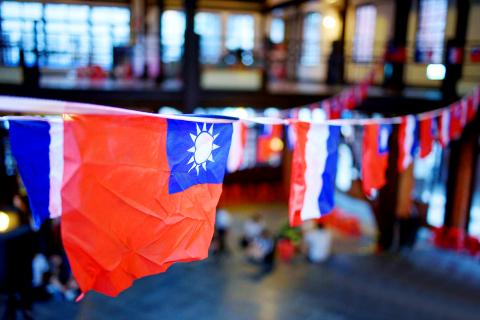This weekend, Association des Francais de Taiwan (台灣法國人協會) will host their annual event celebrating Bastille Day, a French national day that symbolizes glory and unity. This event provides an excellent opportunity to interact with local French citizens. The venue, Ivy Palace (草御殿), a traditional tea room hidden within old storefronts on Taipei’s Dihua street (迪化街), creates a simple yet novel aesthetic.
In celebrating Bastille Day, this event will display many aspects of French culture. Starting at 3pm, the “Gourmet afternoon” will feature a selection of delectable French desserts (crepes, macarons, pastries) and drinks (French wine, beer, soft drinks). Then, at around 6:30pm, live and off-stage performances by dance groups, magicians, acrobats and various artistes will begin. As an exclusive event, the organization has invited an iconic DJ group named French Torch and numerous dance groups, most notably Fuzzy Wall.
The entrance fee for students (NT$300) and children under 12 years old (free) makes this party an ideal destination for a family or a group of friends looking to expand their horizons (NT$400 for adults). The entrance fee includes one raffle ticket and a NT$100 dining voucher.

Photo courtesy of Association des Francais de Taiwan
■ Ivy Palace, 368, Dihua Street, Sec 1, Taipei City (台北市迪化街一段368號)
■ Tomorrow from 3pm to midnight. For more information, visit the official Web site www.taiwanaccueil.com or www.facebook.com/events/1739996592745866/?active tab=discussion

In the March 9 edition of the Taipei Times a piece by Ninon Godefroy ran with the headine “The quiet, gentle rhythm of Taiwan.” It started with the line “Taiwan is a small, humble place. There is no Eiffel Tower, no pyramids — no singular attraction that draws the world’s attention.” I laughed out loud at that. This was out of no disrespect for the author or the piece, which made some interesting analogies and good points about how both Din Tai Fung’s and Taiwan Semiconductor Manufacturing Co’s (TSMC, 台積電) meticulous attention to detail and quality are not quite up to

April 21 to April 27 Hsieh Er’s (謝娥) political fortunes were rising fast after she got out of jail and joined the Chinese Nationalist Party (KMT) in December 1945. Not only did she hold key positions in various committees, she was elected the only woman on the Taipei City Council and headed to Nanjing in 1946 as the sole Taiwanese female representative to the National Constituent Assembly. With the support of first lady Soong May-ling (宋美齡), she started the Taipei Women’s Association and Taiwan Provincial Women’s Association, where she

Chinese Nationalist Party (KMT) Chairman Eric Chu (朱立倫) hatched a bold plan to charge forward and seize the initiative when he held a protest in front of the Taipei City Prosecutors’ Office. Though risky, because illegal, its success would help tackle at least six problems facing both himself and the KMT. What he did not see coming was Taipei Mayor Chiang Wan-an (將萬安) tripping him up out of the gate. In spite of Chu being the most consequential and successful KMT chairman since the early 2010s — arguably saving the party from financial ruin and restoring its electoral viability —

It is one of the more remarkable facts of Taiwan history that it was never occupied or claimed by any of the numerous kingdoms of southern China — Han or otherwise — that lay just across the water from it. None of their brilliant ministers ever discovered that Taiwan was a “core interest” of the state whose annexation was “inevitable.” As Paul Kua notes in an excellent monograph laying out how the Portuguese gave Taiwan the name “Formosa,” the first Europeans to express an interest in occupying Taiwan were the Spanish. Tonio Andrade in his seminal work, How Taiwan Became Chinese,